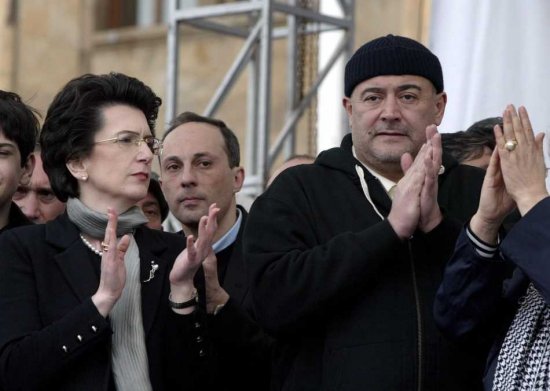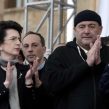
Georgian Government Fine-Tunes its Response to Radical Opposition Offensive
Publication: Eurasia Daily Monitor Volume: 6 Issue: 71
By:

Georgia’s extra-parliamentary opposition has launched its third attempt since mid-2007 at "regime change" -a post-modern version of the old-fashioned toppling of governments through other than electoral means (EDM, April 10 and the article above). This new campaign finds Georgia’s state institutions considerably better prepared to handle the challenge, compared with June and November 2007. The test, however, is far from over, and its outcome uncertain.
Western partners seem to be raising the bar higher for the Georgian government than they would for other countries or even for themselves in situations of political and social protests disruptive to public order. By the same token the radical leaders are being held to lower standards of political behavior than could be accepted in any European country, given their inflammatory potential in a strategically vital country under Russian threat.
The Georgian government is responding with a strategy of maximum transparency and maximum restraint on the level of police and law enforcement. On the political level, President Mikheil Saakashvili and the parliamentary majority are offering to negotiate with opposition leaders about specific adjustments to Georgia’s political system, albeit within the existing electoral cycle.
Well ahead of the opposition’s current campaign, the Georgian government had solicited and received assistance from West European law-enforcement and internal security experts, particularly with regard to methods of crowd control. Several European Union member countries sent additional representatives to observe the series of demonstrations that began on April 9 and any interactions between police and demonstrators. European observers are sitting in the Georgian Internal Affairs Ministry’s Situation Room, by invitation for an in-depth view of ongoing developments and possibility to react in real time.
Internal Affairs Minister Vano Merabishvili and his deputies, Ekaterine Zguladze and Shota Utiashvili, have briefed the mass media -and, through these, the opposition’s demonstrators- about the tactics of police and law enforcement. Police and internal security personnel are guarding the government buildings from inside their courtyards, with a second protective position inside the buildings themselves. Demonstrators are allowed to move about peacefully in central Tbilisi, meet anywhere "at one locations or ten locations," and stay in the streets and squares as long as they choose; in sum, "unlimited freedom to demonstrate peacefully" (Rustavi-2 TV, Imedi TV, April 9 – 12).
The radical leaders’ call for civil disobedience to be launched from April 13 onward could -if heeded by their followers- lead to illegal actions, however. In that case, as National Security Council Secretary Ekaterine Tkeshelashvili has noted, "civil disobedience is not to be confused with other forms of the freedom of assembly" (Rustavi-2 TV, April 12).
The uniformed police and other state and municipal authorities are systematically avoiding direct overt contact with crowds of demonstrators. Rather than risk clashes, the uniformed authorities are essentially leaving the demonstrators to themselves. This self-restraint even applies to sanitation and the fire-fighting services. In one exceptional departure from this policy, a municipal sanitation crew responded to demonstrators’ request to clean up after them, only to be roughed up and forced to withdraw by young demonstrators. This episode has only reinforced the authorities’ non-contact policy. Meanwhile, demonstrators have ostentatiously dumped trash in front of City Hall and the presidential headquarters with impunity (Civil Georgia, April 12).
Television channels, the ownership of which is in hands friendly to the authorities, are covering the events in gory detail, to a society almost certainly oversaturated with politics. The French Ambassador to Georgia, Eric Fournier, touring all the TV channels’ newsrooms during the day of the largest demonstration, concluded that all channels were showing "a full, objective picture, proving to us that Georgia is developing as a democratic country. This is very important for us Europeans" (Rustavi-2 TV, April 9). Apparently, from this perspective, Georgia has graduated to enjoying at least this European luxury if not other ones.
On the political level, President Saakashvili as well as Parliamentary Chairman Davit Bakradze and the chairmen of relevant parliamentary commissions have offered to negotiate with opposition leaders on a wider distribution of power and a stronger checks-and-balances system than is presently the case. The proposals include: strengthening the parliament’s powers and its oversight functions; changing the electoral law to allow higher parliamentary representation of small parties; and introducing an elective system for mayors and local administration officials.
The state leadership rejects any ultimatum, such as the demand for the president’s resignation before the expiry of his term in 2013. By the same token the government and parliamentary leaders take the position that they would listen and negotiate those changes irrespective of the numbers of demonstrators in the streets, i.e., even if those numbers dwindle.
Thus far, the extra-parliamentary opposition’s radical leaders reject any negotiation. Alternatively they would only negotiate about the modalities of the President’s resignation and new elections; and would only hold such negotiations as a televised spectacle. Saakashvili and the parliamentary leadership -as Bakradze has summed up their position- rule out a televised spectacle, calling instead for a specifics-focused, result-oriented dialogue. They do not propose to "win the hearts of certain oppositionists" but, rather, to agree on reforms that would establish long-term stability and a durable political system (Civil Georgia, April 10, 12).
The opposition’s lone moderate leader, Irakli Alasania, is attempting to position himself as a mediator. Alasania comes from the heart of the political establishment and is a rare level-headed personality among opposition leaders. But, lacking a political basis of his own, he cannot afford to lose the radicals’ support in the streets. Far better placed to mediate is the European Union’s Special Representative for the South Caucasus, Peter Semneby, and the Czech Ambassador to Georgia, Ivan Jestrab, on behalf of the EU’s incumbent presidency, both of whom are in constant contact with the government and the opposition.




